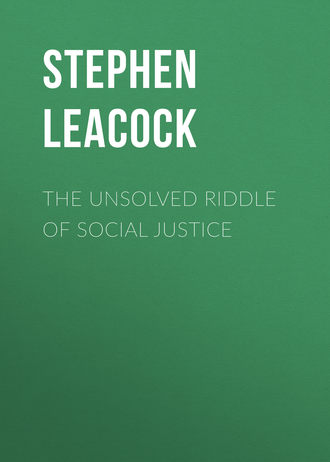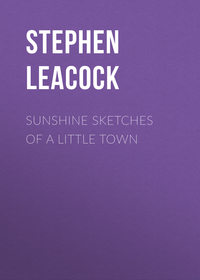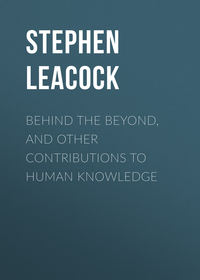 полная версия
полная версияThe Unsolved Riddle of Social Justice

Stephen Leacock
The Unsolved Riddle of Social Justice
I.—The Troubled Outlook of the Present Hour
THESE are troubled times. As the echoes of the war die away the sound of a new conflict rises on our ears. All the world is filled with industrial unrest. Strike follows upon strike. A world that has known five years of fighting has lost its taste for the honest drudgery of work. Cincinnatus will not back to his plow, or, at the best, stands sullenly between his plow-handles arguing for a higher wage.
The wheels of industry are threatening to stop. The laborer will not work because the pay is too low and the hours are too long. The producer cannot employ him because the wage is too high, and the hours are too short. If the high wage is paid and the short hours are granted, then the price of the thing made, so it seems, rises higher still. Even the high wages will not buy it. The process apparently moves in a circle with no cessation to it. The increased wages seem only to aggravate the increasing prices. Wages and prices, rising together, call perpetually for more money, or at least more tokens and symbols, more paper credit in the form of checks and deposits, with a value that is no longer based on the rock-bottom of redemption into hard coin, but that floats upon the mere atmosphere of expectation.
But the sheer quantity of the inflated currency and false money forces prices higher still. The familiar landmarks of wages, salaries and prices are being obliterated. The "scrap of paper" with which the war began stays with us as its legacy. It lies upon the industrial landscape like snow, covering up, as best it may, the bare poverty of a world desolated by war.
Under such circumstances national finance seems turned into a delirium. Billions are voted where once a few poor millions were thought extravagant. The war debts of the Allied Nations, not yet fully computed, will run from twenty-five to forty billion dollars apiece. But the debts of the governments appear on the other side of the ledger as the assets of the citizens. What is the meaning of it? Is it wealth or is it poverty? The world seems filled with money and short of goods, while even in this very scarcity a new luxury has broken out. The capitalist rides in his ten thousand dollar motor car. The seven-dollar-a-day artisan plays merrily on his gramophone in the broad daylight of his afternoon that is saved, like all else, by being "borrowed" from the morning. He calls the capitalist a "profiteer." The capitalist retorts with calling him a "Bolshevik."
Worse portents appear. Over the rim of the Russian horizon are seen the fierce eyes and the unshorn face of the real and undoubted Bolshevik, waving his red flag. Vast areas of what was a fertile populated world are overwhelmed in chaos. Over Russia there lies a great darkness, spreading ominously westward into Central Europe. The criminal sits among his corpses. He feeds upon the wreck of a civilization that was.
The infection spreads. All over the world the just claims of organized labor are intermingled with the underground conspiracy of social revolution. The public mind is confused. Something approaching to a social panic appears. To some minds the demand for law and order overwhelms all other thoughts. To others the fierce desire for social justice obliterates all fear of a general catastrophe. They push nearer and nearer to the brink of the abyss. The warning cry of "back" is challenged by the eager shout of "forward!" The older methods of social progress are abandoned as too slow. The older weapons of social defense are thrown aside as too blunt. Parliamentary discussion is powerless. It limps in the wake of the popular movement. The "state", as we knew it, threatens to dissolve into labor unions, conventions, boards of conciliation, and conferences. Society shaken to its base, hurls itself into the industrial suicide of the general strike, refusing to feed itself, denying its own wants.
This is a time such as there never was before. It represents a vast social transformation in which there is at stake, and may be lost, all that has been gained in the slow centuries of material progress and in which there may be achieved some part of all that has been dreamed in the age-long passion for social justice.
For the time being, the constituted governments of the world survive as best they may and accomplish such things as they can, planless, or planning at best only for the day. Sufficient, and more than sufficient, for the day is the evil thereof.
Never then was there a moment in which there was greater need for sane and serious thought. It is necessary to consider from the ground up the social organization in which we live and the means whereby it may be altered and expanded to meet the needs of the time to come. We must do this or perish. If we do not mend the machine, there are forces moving in the world that will break it. The blind Samson of labor will seize upon the pillars of society and bring them down in a common destruction.
Few persons can attain to adult life without being profoundly impressed by the appalling inequalities of our human lot. Riches and poverty jostle one another upon our streets. The tattered outcast dozes on his bench while the chariot of the wealthy is drawn by. The palace is the neighbor of the slum. We are, in modern life, so used to this that we no longer see it.
Inequality begins from the very cradle. Some are born into an easy and sheltered affluence. Others are the children of mean and sordid want. For some the long toil of life begins in the very bloom time of childhood and ends only when the broken and exhausted body sinks into a penurious old age. For others life is but a foolish leisure with mock activities and mimic avocations to mask its uselessness. And as the circumstances vary so too does the native endowment of the body and the mind. Some born in poverty rise to wealth. An inborn energy and capacity bid defiance to the ill-will of fate. Others sink. The careless hand lets fall the cradle gift of wealth.
Thus all about us is the moving and shifting spectacle of riches and poverty, side by side, inextricable.
The human mind, lost in a maze of inequalities that it cannot explain and evils that it cannot, singly, remedy, must adapt itself as best it can. An acquired indifference to the ills of others is the price at which we live. A certain dole of sympathy, a casual mite of personal relief is the mere drop that any one of us alone can cast into the vast ocean of human misery. Beyond that we must harden ourselves lest we too perish. We feed well while others starve. We make fast the doors of our lighted houses against the indigent and the hungry. What else can we do? If we shelter one what is that? And if we try to shelter all, we are ourselves shelterless.
But the contrast thus presented is one that has acquired a new meaning in the age in which we live. The poverty of earlier days was the outcome of the insufficiency of human labor to meet the primal needs of human kind. It is not so now. We live in an age that is at best about a century and a half old—the age of machinery and power. Our common reading of history has obscured this fact. Its pages are filled with the purple gowns of kings and the scarlet trappings of the warrior. Its record is largely that of battles and sieges, of the brave adventure of discovery and the vexed slaughter of the nations. It has long since dismissed as too short and simple for its pages, the short and simple annals of the poor. And the record is right enough. Of the poor what is there to say? They were born; they lived; they died. They followed their leaders, and their names are forgotten.
But written thus our history has obscured the greatest fact that ever came into it—the colossal change that separates our little era of a century and a half from all the preceding history of mankind—separates it so completely that a great gulf lies between, across which comparison can scarcely pass, and on the other side of which a new world begins.
It has been the custom of our history to use the phrase the "new world" to mark the discoveries of Columbus and the treasure-hunt of a Cortes or a Pizarro. But what of that? The America that they annexed to Europe was merely a new domain added to a world already old. The "new world" was really found in the wonder-years of the eighteenth and early nineteenth centuries. Mankind really entered upon it when the sudden progress of liberated science bound the fierce energy of expanding stream and drew the eager lightning from the cloud.
Here began indeed, in the drab surroundings of the workshop, in the silent mystery of the laboratory, the magic of the new age.
But we do not commonly realize the vastness of the change. Much of our life and much of our thought still belongs to the old world. Our education is still largely framed on the old pattern. And our views of poverty and social betterment, or what is possible and what is not, are still largely conditioned by it.
In the old world, poverty seemed, and poverty was, the natural and inevitable lot of the greater portion of mankind. It was difficult, with the mean appliances of the time, to wring subsistence from the reluctant earth. For the simplest necessaries and comforts of life all, or nearly all, must work hard. Many must perish for want of them. Poverty was inevitable and perpetual. The poor must look to the brightness of a future world for the consolation that they were denied in this. Seen thus poverty became rather a blessing than a curse, or at least a dispensation prescribing the proper lot of man. Life itself was but a preparation and a trial—a threshing floor where, under the "tribulation" of want, the wheat was beaten from the straw. Of this older view much still survives, and much that is ennobling. Nor is there any need to say goodby to it. Even if poverty were gone, the flail could still beat hard enough upon the grain and chaff of humanity.
But turn to consider the magnitude of the change that has come about with the era of machinery and the indescribable increase which it has brought to man's power over his environment. There is no need to recite here in detail the marvelous record of mechanical progress that constituted the "industrial revolution" of the eighteenth century. The utilization of coal for the smelting of iron ore; the invention of machinery that could spin and weave; the application of the undreamed energy of steam as a motive force, the building of canals and the making of stone roads—these proved but the beginnings. Each stage of invention called for a further advance. The quickening of one part of the process necessitated the "speeding up" of all the others. It placed a premium—a reward already in sight—upon the next advance. Mechanical spinning called forth the power loom. The increase in production called for new means of transport. The improvement of transport still further swelled the volume of production. The steamboat of 1809 and the steam locomotive of 1830 were the direct result of what had gone before. Most important of all, the movement had become a conscious one. Invention was no longer the fortuitous result of a happy chance. Mechanical progress, the continual increase of power and the continual surplus of product became an essential part of the environment, and an unconscious element in the thought and outlook of the civilized world.
No wonder that the first aspect of the age of machinery was one of triumph. Man had vanquished nature. The elemental forces of wind and fire, of rushing water and driving storm before which the savage had cowered low for shelter, these had become his servants. The forest that had blocked his path became his field. The desert blossomed as his garden.
The aspect of industrial life altered. The domestic industry of the cottage and the individual labor of the artisan gave place to the factory with its regiment of workers and its steam-driven machinery. The economic isolation of the single worker, of the village, even of the district and the nation, was lost in the general cohesion in which the whole industrial world merged into one.
The life of the individual changed accordingly. In the old world his little sphere was allotted to him and there he stayed. His village was his horizon. The son of the weaver wove and the smith reared his children to his trade. Each did his duty, or was adjured to do it, in the "state of life to which it had pleased God to call him." Migration to distant occupations or to foreign lands was but for the adventurous few. The ne'er-do-well blew, like seed before the wind, to distant places, but mankind at large stayed at home. Here and there exceptional industry or extraordinary capacity raised the artisan to wealth and turned the "man" into the "master." But for the most part even industry and endowment were powerless against the inertia of custom and the dead-weight of environment. The universal ignorance of the working class broke down the aspiring force of genius. Mute inglorious Miltons were buried in country churchyards.
In the new world all this changed. The individual became but a shifting atom in the vast complex, moving from place to place, from occupation to occupation and from gradation to gradation of material fortune.
The process went further and further. The machine penetrated everywhere, thrusting aside with its gigantic arm the feeble efforts of handicraft. It laid its hold upon agriculture, sowing and reaping the grain and transporting it to the ends of the earth. Then as the nineteenth century drew towards its close, even the age of steam power was made commonplace by achievements of the era of electricity.
All this is familiar enough. The record of the age of machinery is known to all. But the strange mystery, the secret that lies concealed within its organization, is realized by but few. It offers, to those who see it aright, the most perplexing industrial paradox ever presented in the history of mankind. With all our wealth, we are still poor. After a century and a half of labor-saving machinery, we work about as hard as ever. With a power over nature multiplied a hundred fold, nature still conquers us. And more than this. There are many senses in which the machine age seems to leave the great bulk of civilized humanity, the working part of it, worse off instead of better. The nature of our work has changed. No man now makes anything. He makes only a part of something, feeding and tending a machine that moves with relentless monotony in the routine of which both the machine and its tender are only a fractional part.
For the great majority of the workers, the interest of work as such is gone. It is a task done consciously for a wage, one eye upon the clock. The brave independence of the keeper of the little shop contrasts favorably with the mock dignity of a floor walker in an "establishment." The varied craftsmanship of the artisan had in it something of the creative element that was the parent motive of sustained industry. The dull routine of the factory hand in a cotton mill has gone. The life of a pioneer settler in America two hundred years ago, penurious and dangerous as it was, stands out brightly beside the dull and meaningless toil of his descendant.
The picture must not be drawn in colors too sinister. In the dullest work and in the meanest lives in the new world to-day there are elements that were lacking in the work of the old world. The universal spread of elementary education, the universal access to the printed page, and the universal hope of better things, if not for oneself, at least for one's children, and even the universal restlessness that the industrialism of to-day have brought are better things than the dull plodding passivity of the older world. Only a false mediævalism can paint the past in colors superior to the present. The haze of distance that dims the mountains with purple, shifts also the crude colors of the past into the soft glory of retrospect. Misled by these, the sentimentalist may often sigh for an age that in a nearer view would be seen filled with cruelty and suffering. But even when we have made every allowance for the all too human tendency to soften down the past, it remains true that in many senses the processes of industry for the worker have lost in attractiveness and power of absorption of the mind during the very period when they have gained so enormously in effectiveness and in power of production.
The essential contrast lies between the vastly increased power of production and its apparent inability to satisfy for all humanity the most elementary human wants; between the immeasurable saving of labor effected by machinery and the brute fact of the continuance of hard-driven, unceasing toil.
Of the extent of this increased power of production we can only speak in general terms. No one, as far as I am aware, has yet essayed to measure it. Nor have we any form of calculus or computation that can easily be applied. If we wish to compare the gross total of production effected to-day with that accomplished a hundred and fifty years ago, the means, the basis of calculation, is lacking. Vast numbers of the things produced now were not then in existence. A great part of our production of to-day culminates not in productive goods, but in services, as in forms of motion, or in ability to talk across a distance.
It is true that statistics that deal with the world's production of cotton, or of oil, or of iron and steel present stupendous results. But even these do not go far enough. For the basic raw materials are worked into finer and finer forms to supply new "wants" as they are called, and to represent a vast quantity of "satisfactions" not existing before.
Nor is the money calculus of any avail. Comparison by prices breaks down entirely. A bushel of wheat stands about where it stood before and could be calculated. But the computation, let us say, in price-values of the Sunday newspapers produced in one week in New York or the annual output of photographic apparatus, would defy comparison. Of the enormous increase in the gross total of human goods there is no doubt. We have only to look about us to see it. The endless miles of railways, the vast apparatus of the factories, the soaring structures of the cities bear easy witness to it. Yet it would be difficult indeed to compute by what factor the effectiveness of human labor working with machinery has been increased.
But suppose we say, since one figure is as good as another, that it has been increased a hundred times. This calculation must be well within the facts and can be used as merely a more concrete way of saying that the power of production has been vastly increased. During the period of this increase, the numbers of mankind in the industrial countries have perhaps been multiplied by three to one. This again is inexact, since there are no precise figures of population that cover the period. But all that is meant is that the increase in one case is, quite obviously, colossal, and in the other case is evidently not very much.
Here then is the paradox.
If the ability to produce goods to meet human wants has multiplied so that each man accomplishes almost thirty or forty times what he did before, then the world at large ought to be about thirty or fifty times better off. But it is not. Or else, as the other possible alternative, the working hours of the world should have been cut down to about one in thirty of what they were before. But they are not. How, then, are we to explain this extraordinary discrepancy between human power and resulting human happiness?
The more we look at our mechanism of production the more perplexing it seems. Suppose an observer were to look down from the cold distance of the moon upon the seething ant-hill of human labor presented on the surface of our globe; and suppose that such an observer knew nothing of our system of individual property, of money payments and wages and contracts, but viewed our labor as merely that of a mass of animated beings trying to supply their wants. The spectacle to his eyes would be strange indeed. Mankind viewed in the mass would be seen to produce a certain amount of absolutely necessary things, such as food, and then to stop. In spite of the fact that there was not food enough to go round, and that large numbers must die of starvation or perish slowly from under-nutrition, the production of food would stop at some point a good deal short of universal satisfaction. So, too, with the production of clothing, shelter and other necessary things; never enough would seem to be produced, and this apparently not by accident or miscalculation, but as if some peculiar social law were at work adjusting production to the point where there is just not enough, and leaving it there. The countless millions of workers would be seen to turn their untired energies and their all-powerful machinery away from the production of necessary things to the making of mere comforts; and from these, again, while still stopping short of a general satisfaction, to the making of luxuries and superfluities. The wheels would never stop. The activity would never tire. Mankind, mad with the energy of activity, would be seen to pursue the fleeing phantom of insatiable desire. Thus among the huge mass of accumulated commodities the simplest wants would go unsatisfied. Half-fed men would dig for diamonds, and men sheltered by a crazy roof erect the marble walls of palaces. The observer might well remain perplexed at the pathetic discord between human work and human wants. Something, he would feel assured, must be at fault either with the social instincts of man or with the social order under which he lives.
And herein lies the supreme problem that faces us in this opening century. The period of five years of war has shown it to us in a clearer light than fifty years of peace. War is destruction—the annihilation of human life, the destruction of things made with generations of labor, the misdirection of productive power from making what is useful to making what is useless. In the great war just over, some seven million lives were sacrificed; eight million tons of shipping were sunk beneath the sea; some fifty million adult males were drawn from productive labor to the lines of battle; behind them uncounted millions labored day and night at making the weapons of destruction. One might well have thought that such a gigantic misdirection of human energy would have brought the industrial world to a standstill within a year. So people did think. So thought a great number, perhaps the greater number, of the financiers and economists and industrial leaders trained in the world in which we used to live. The expectation was unfounded. Great as is the destruction of war, not even five years of it have broken the productive machine. And the reason is now plain enough. Peace, also—or peace under the old conditions of industry—is infinitely wasteful of human energy. Not more than one adult worker in ten—so at least it might with confidence be estimated—is employed on necessary things. The other nine perform superfluous services. War turns them from making the glittering superfluities of peace to making its grim engines of destruction. But while the tenth man still labors, the machine, though creaking with its dislocation, can still go on. The economics of war, therefore, has thrown its lurid light upon the economics of peace.
These I propose in the succeeding chapters to examine. But it might be well before doing so to lay stress upon the fact that while admitting all the shortcomings and the injustices of the régime under which we have lived, I am not one of those who are able to see a short and single remedy. Many people when presented with the argument above, would settle it at once with the word "socialism." Here, they say, is the immediate and natural remedy. I confess at the outset, and shall develop later, that I cannot view it so. Socialism is a mere beautiful dream, possible only for the angels. The attempt to establish it would hurl us over the abyss. Our present lot is sad, but the frying pan is at least better than the fire.
II.—Life, Liberty and the Pursuit of Happiness
"ALL men," wrote Thomas Jefferson in framing the Declaration of Independence, "have an inalienable right to life, liberty and the pursuit of happiness." The words are more than a felicitous phrase. They express even more than the creed of a nation. They embody in themselves the uppermost thought of the era that was dawning when they were written. They stand for the same view of society which, in that very year of 1776, Adam Smith put before the world in his immortal "Wealth of Nations" as the "System of Natural Liberty." In this system mankind placed its hopes for over half a century and under it the industrial civilization of the age of machinery rose to the plenitude of its power.









